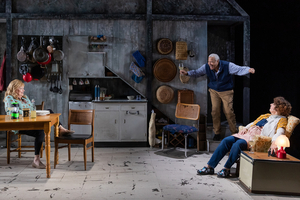Review: THE CHILDREN: Cleaning Up Our Own Mess

The Children
Written by Lucy Kirkwood, Directed by Bryn Boice; Scenic Design, Cristina Todesco; Costume Design, Rachel Padula-Shufelt; Lighting Design, Jeff Adelberg; Sound Design, David Remedios; Production Stage Manager, Rachel Sturm; Assistant Stage Manager, Emily D. Bahm; Props Master, Madeline Hartrich; Fight/Intimacy Consultant, Jessica Scout Malone
CAST (in order of appearance): Karen MacDonald, Paula Plum, Tyrees Allen
Performances through March 28 by SpeakEasy Stage Company at the Roberts Studio Theatre in the Calderwood Pavilion at the Boston Center for the Arts, 527 Tremont Street, Boston, MA; Box Office 617-933-8600 to www.SpeakEasyStage.com
The Boston premiere of Lucy Kirkwood's 2018 Tony Award-nominated play The Children at SpeakEasy Stage Company is an affecting drama, thanks to a combination of the playwright's excellence at her craft, Director Bryn Boice's focus, and the trio of Elliot Norton Award-winning actors whose portrayals constitute a collective master class. Inspired by the 2011 nuclear disaster in Fukushima, Japan, The Children puts issues of climate change, the environment, and a generation's responsibility for stewardship under an unforgiving spotlight, challenging the audience to engage in self-reflection.
Knowing the subject matter going in, one might be surprised at the moments of levity and lightheartedness, while not being surprised at how organic they seem when delivered by the likes of Karen MacDonald (Rose), Paula Plum (Hazel), and Tyrees Allen (Robin). The action takes place in a small cottage on the east coast of England, a rustic retreat (authentically rendered by Cristina Todesco's scenic design) where retired, married physicists Hazel and Robin have taken up residence since an earthquake and tsunami resulted in a devastating nuclear accident at the power plant where they had worked. They were forced to evacuate their farm within the contaminated "exclusion zone," and now struggle to adapt to their new reality. After an absence of 38 years, their former co-worker Rose unexpectedly appears on their doorstep, toting the baggage from their past relationships and harboring a secret mission that will eventually be revealed.
Presented in one uninterrupted act of approximately an hour and fifty minutes, Boice gives The Children a pace that mirrors real life. Moments of mundane conversation tick by at average speed, while awkward silences when conversation lags drag the second hand on a slow rotation. Suddenly, hot button topics flare up, quickly accelerating the dialogue and ratcheting up the emotion. In each instance, the actors react accordingly, with unmatched verisimilitude. Plum and MacDonald respond to each other as scene partners almost as if they are two halves of one person. Although their characters have wildly different personalities, the shortcomings of one are shored up by the strengths of the other, and Allen finds a nuanced way to show that Robin connects with something in each of them.
As much as their history informs the way they view each other, their life choices and the experiences they've had make them who they are and account for the yawning philosophical chasm that stands between them. Rose has never married, has no children, and has lived a less-tethered life, while Hazel raised four children while working full-time and running a household. In fact, Rose says of her, "That woman holds up the earth," with a mix of envy and wonderment. Still, although Hazel's life has the appearance of doing all the responsible, grown-up things, Rose is the one exhibiting a sense of ownership and responsibility for the disaster and its consequences, of owing something to the younger and future generations. Hazel's attitude is more myopic, limited to what she owes her children and grandchildren, not to mention how she envisions living out her own life.
Kirkwood's accomplishment is to draw attention to these serious matters of global concern by examining their impact on three accessible individuals, all of whom have invested their lives in the scientific arena. She raises more questions than she answers, but the play will make you think and take a position. Are we culpable for good faith actions that turn out later to have dire consequences? How much are we willing to sacrifice for the greater good? As Rose, Hazel, and Robin struggle with these issues, we see them come into focus, even as we wonder if it's too little, too late.
Photo credit: Maggie Hall Photography (Karen MacDonald, Tyrees Allen, Paula Plum)
Reader Reviews

Videos

